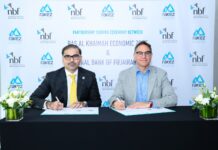As a retail bank, what was your most influencing experience of 2020?
The commitment of our staff to focus on how we could continue to serve our customers and support them, when much of the region was in lockdown, was remarkable and left a lasting impression on me. Our branches remained open wherever we were able to do so, with our staff taking a level of personal risk whilst maintaining the highest standard of safety and care.
In our contact centers, we set out to achieve 100 per cent of staff working from home as quickly as possible, to safeguard our people and alleviate any service disruption when our customers needed us the most. We saw incredible engagement amongst our teams during this time; laptops were flown to India, hundreds of desktops were relocated to our colleagues’ homes and in some cases Wi-Fi and power supply units were provided. Over 900 contact center staff were set up to work from home in under three weeks.
Using video technology and digital signatures, our clients benefitted from being able to invest, redeem, change asset classes and de-risk, all from the comfort of their homes. We also rolled out HSBC Voice ID in the region, which enables customers to use just their voice for verification when using our phone banking services.
Within matter of weeks, HSBC had fully operational virtual solution for clients and we made significant strides towards mobile-first propositions, which we’re now in a great position to build on in 2021. Such agility and ability to react to the world around us is an important aspect to being an HSBC client.
How will 2020 shape the direction of regional retail and wealth banking in 2021?
The effect that the global pandemic has had on retail and wealth banking in the region has been very evident. At the start of 2020, the sector was on a steady path to digitisation. But the pandemic sped up processes and forced new behaviours which might have otherwise taken years, and consequentially the personal banking sector accelerated its digital ambitions. It became and continues to be vitally important to understand what a client’s needs are as they adapt to changing financial situations and develop new priorities.
For HSBC, the regional direction of banking in 2021 and beyond is a blended approach where our customers can access an expanded range of offerings via our digital channels, but at the same time have the option to talk to our people when they need support or expertise for their more complex needs. We’ve seen the regulatory environment rapidly evolve and, quite rightly, regulators have become far more active by implementing industry-wide standards to further protect customers. Increased transparency on fees, commission caps and fully qualified advisors are just some of the requirements that now must be met, with much more to come.
What is your key customer demographic for 2021 and why?
Our goal this year, as always, is to help and support our customers as they aspire to achieve things in their lives, whether that’s economic prosperity, satisfying entrepreneurial goals, or supporting their families and building their future.
We have an ambition to establish a market leading wealth management brand by continuing to digitise our wealth propositions, including FX, insurance and investments. Digital wealth solutions are already an area of focus amongst most wealth managers as customers are preferring to interact digitally, especially the mass affluent segment. There is still a desire from clients to see their advisor but mainly for the initial investment; all servicing already requires a digital solution to be competitive.
This year, HSBC is expanding its Private Banking business in the UAE with new operations in Abu Dhabi Global Market (ADGM), the international financial centre in the nation’s capital. The new licence and location is part of the bank’s plan to substantially grow its wealth management operations in the country and almost double its assets under management in the UAE. HSBC plans to make the UAE a global hub for its international wealth management expertise.
We will also continue to build our book of Wealth clients including our Jade client base, following its launch in the UAE at the start of 2020. HSBC Jade is a bespoke bank account offering a unique combination of personalised relationship management, advanced wealth solutions and luxury lifestyle services to support the needs of high-net-worth individuals. It has been a perfect fit for the UAE and we will continue to engage with this demographic through 2021 and beyond.
How has the higher speed of digitization increased the ways you work with different customer groupings or generations?
The focus this year is digital simplification; prioritising migration onto latest platforms and straight-through processing journeys. We’re focusing on a mobile-first agenda, including a global money account, and achieving our adoption ambitions of 100% new-to-bank digitally active customers as well as doubling our mobile active customers. A fully operational wealth management digital experience is also on the horizon.
Last year, HSBC UAE launched its online trading platform that enables customers to trade international securities on major stock exchanges in real-time. The platform – incorporated into the Personal Internet Banking site – allows clients to personally manage their equity securities portfolio 24/7, and submit orders themselves with real-time execution. Clients can access stock exchanges in the United States, United Kingdom and Hong Kong, which together cover around 60 per cent of capital markets across the globe. Impressively, our teams rolled out this new product in the midst of the pandemic, and the higher speed of digitisation was certainly an influencing factor.
Is now a better time to be a retail banking customer in the region than it was five years ago?
The advancement in online and digital banking tools, particularly through the larger banks and fintechs, means today’s customers have genuine omnichannel choice. Clients want convenience, accuracy and speed, and while they may still want to discuss that big credit or investment with an advisor in person, today’s technology allows them to be more efficient in their decision making.
Digital development has both enhanced personal banking and also required it to keep up with the digital developments of non-financial sectors. Take biometrics for example – customers expect to be able to access their online banking profiles and send and receive payments with the same ease and speed as they access news websites or login to their social media pages. When being measured by customer experience, regional banks are no longer competing only with each other but also with all online and digital businesses, which is exciting.











